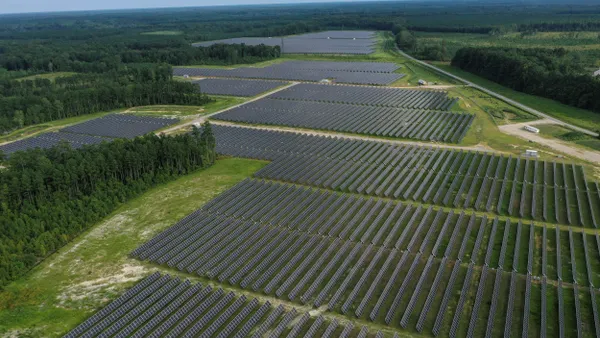Dive Brief:
- A bill to expand solar access in North Carolina is gaining traction, thanks to more than two dozen co-sponsors and the support of business and renewable energy groups in the state.
- The Energy Freedom Act, proposed by Rep. John Szoka (R) has been referred to the House Committee on Public Utilities, and advocates say they have the support necessary to push it through, even without backing from Duke Energy, the state's dominant electricity provider.
- The News & Observer published an editorial taking a moderate tone on the bill, saying all stakeholders, including the incumbent utilities, need to be involved in effecting such significant changes to the state's energy laws.
Dive Insight:
John Szoka, a Republican in North Carolina's House of Representatives, has done something rare: He's changed his opinion on renewable energy. Elected in 2012 as an opponent of solar energy, the conservative lawmaker now says the numbers and facts have him backing cleaner power. He's sponsored the Energy Freedom Act, which would allow third party financing and for solar power generators to sell their output directly to customers.
And the bill is gaining traction, with 26 co-sponsors and the backing of businesses and environmental groups, according to the Charlotte Business Journal.
There are opponents, of course. But even Duke Energy's reservations — the utility has a solar business and of course is concerned about losing customers — has struck a moderate tone in news stories. The News & Observer published an editorial largely in favor of the proposed changes, but also advocating a stakeholder-inclusive approach to the proposed changes.
"Lawmakers need to bring a change as monumental as this to the table with all the blueprints drawn and all the lines connected, so to speak," the newspaper wrote in an editorial.
Duke, for its part, says a more holistic approach to solar energy policy is preferable, and points to a recent deal struck in South Carolina with the solar industry as a model to build on.
“We believe a comprehensive approach is the best way to make progress on solar in North Carolina,” Duke Energy Communications Manager Randy Wheeless told Utility Dive last month. “What we did in South Carolina worked out well. There was give and take. Not everybody was 100% happy but at the end of the day we had a framework for how we would do things going forward. And there was not a big fight.”
“We don’t want North Carolina to turn into the kind of state that argues over these things constantly and never gets anything done," he said.














